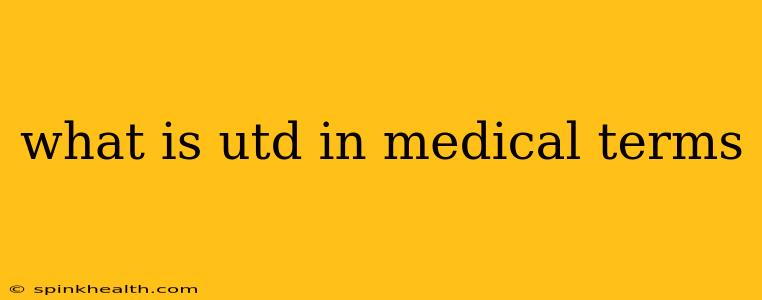The medical abbreviation "UTD" stands for "up-to-date." It's a simple term, but its implications are far-reaching, particularly within the context of patient care and medical records. Imagine a bustling hospital, where precision and timeliness are paramount. In this whirlwind, "UTD" acts as a vital signifier, ensuring everyone is on the same page, literally and figuratively.
This seemingly small abbreviation carries significant weight because it signifies that a patient's vaccinations, medications, and overall healthcare status are current and consistent with established guidelines. Think of it as a green light, indicating that a patient's preventive care is current and that there are no immediate, easily preventable health risks.
Let's explore what "UTD" means in more specific contexts:
What does UTD mean regarding vaccinations?
A patient's vaccination record being UTD means they've received all recommended vaccines appropriate for their age, health status, and lifestyle. This includes routine childhood immunizations, boosters for adults, and any travel-related vaccines. For example, a child who is UTD on their vaccinations would have received their MMR (measles, mumps, rubella), polio, and chickenpox vaccines at the appropriate times. Similarly, an adult might be considered UTD if they've received their tetanus booster within the recommended timeframe. This comprehensive coverage is crucial for preventing vaccine-preventable diseases and maintaining public health.
What does it mean when a patient's medications are UTD?
When discussing medications, a patient being UTD indicates they're taking their prescribed drugs as directed by their doctor and that their prescriptions are current. This means no missed doses, no expired medications, and no gaps in their treatment plan. Maintaining a UTD medication regimen is vital for managing chronic illnesses, preventing acute exacerbations, and ensuring the effectiveness of therapies. Failing to keep medications UTD can lead to health complications and even hospitalization.
What other aspects of healthcare does UTD encompass?
Beyond vaccinations and medications, "UTD" can also refer to other aspects of a patient's healthcare. This might include:
- Preventative screenings: Are their regular checkups, mammograms, colonoscopies, etc., current?
- Chronic disease management: Are they actively managing conditions like diabetes or hypertension with appropriate monitoring and treatment?
- Mental health: Are they receiving necessary mental healthcare and follow-up appointments?
The overall goal is to ensure that all aspects of a patient's health are properly addressed and maintained to the best possible standard. Being UTD signifies a proactive approach to health, aiming for prevention and early intervention.
How is UTD used in medical practice?
The term UTD appears frequently in medical charts, patient files, and during physician consultations. It's a concise way for healthcare providers to quickly communicate a patient's healthcare status. For instance, a nurse might note in a patient's chart: "Vaccinations UTD," or a doctor might say, "Let's make sure your diabetes management is UTD."
What happens if a patient is NOT UTD?
If a patient isn't UTD, it typically indicates a need for intervention. This could involve scheduling vaccinations, refilling prescriptions, addressing missed appointments, or initiating new treatment plans. Staying UTD isn't merely a matter of compliance; it’s an essential component of proactive healthcare and well-being.
In conclusion, while "UTD" is a simple abbreviation, it holds significant meaning in the medical world. It represents a patient's commitment to maintaining their health through timely preventative care and adherence to medical recommendations. Understanding this term empowers both patients and medical professionals to prioritize health and wellness.

